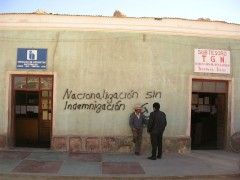-

Entre nacionalizar y privatizar: buscando un equilibrio en Bolivia
Abstract During the 90’s, Bolivia’s economic policies were driven by the principles of the Washington Consensus which had privatization of state-owned companies as one of its core principles. Multiple companies were nationalized and they produced very poor results as the private owners not only failed to deliver their promises but […]
-

Mujer, joven, trabajadora y pobre
Abstract: For women in El Salvador, living in the city and having a steady job are not a guarantee for overcoming poverty. Thousands of female workers in sectors such as domestic service, and the textile and clothing industry, work for low wages with which they must keep their families. And they are […]
-

¿Sostenibilidad? ¿Crecimiento? ¿Crecimiento inclusivo?
Abstract: Growth vs. Sustainability? Inclusive growth? These questions are actual future challenges. No one denies that. Yet here I suggest another way of reading those questions, of raising other questions and see deeper so that we can visualize what is actually at stake: human beings. Don’t mind me, I am […]
-

Inclusive growth in Brazil: Going beyond Bolsa Família
When discussing inclusive growth in Brazil, most economists interested in development focus on the central role played by the Bolsa Família (Family Allowance) program in improving living standards among the country’s poorest. This program is now one of the most scrutinized social programs in the world, garnering international praise from […]
-

Ending coziness: A new status for domestic workers in Brazil
A nation essentially dedicated to agriculture for so long has to face some serious challenges when modernization touches rural areas and expels the people who live there. “The city is, more than ever, a poverty pole”, says Milton Santos, a Brazilian geographer in “A Urbanização Brasileira”(“Urbanization in Brazil”), a place whose […]
